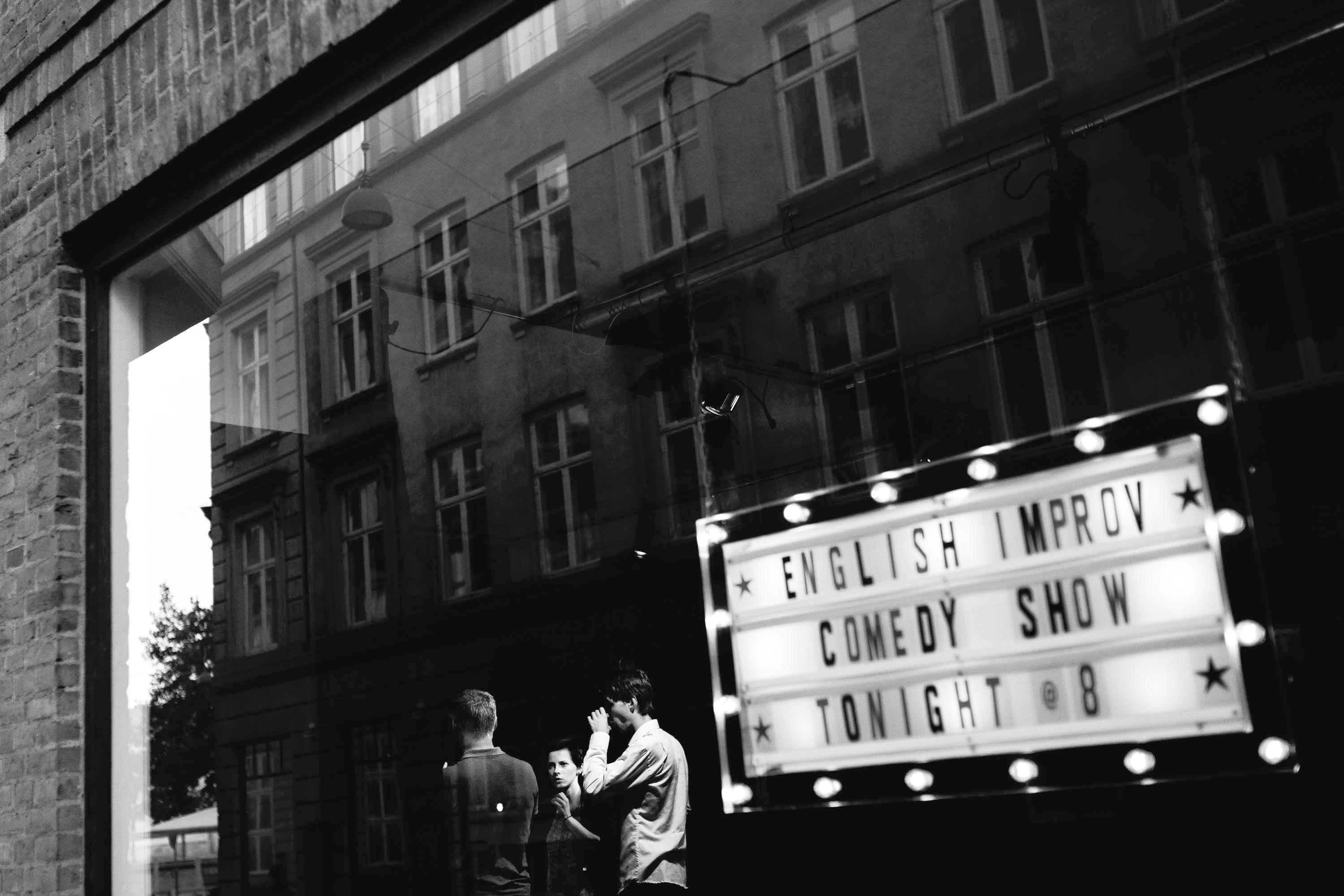The Brits love their comedy. Whether it’s sitcoms, stand-ups or slapstick, they’ve given the world some of its most popular ever comedians: Monty Python, Ricky Gervais and, yes, even Benny Hill.
But now the country has reached a saturation point, which might explain why comedians have been so busy stealing jobs on television off better-qualified, less witty presenters to front documentaries about history, cars and even the paintings of Vilhelm Hammershøi.
Invasion of Denmark
Some comedians, of course, choose to leave the cauldron of competition that is the UK and venture to new, untested territories like Denmark. With a sense of humour similar to the Brits, many are warmly received, not least at the newly-established Improv Comedy Copenhagen Theatre (ICCT).
With this in mind, we caught up with four foreigners to find out how their comedy careers are going since arriving here, along with a Dane who prefers performing in English – in training to present a documentary one day, we’re guessing.
THE MAN FROM AARHUS
Name: Conrad Molden
Nationality: British
Age: 26
Type of comedian: stand-up
Years of experience: 3.5
Living in Denmark since: 2012
Next performance in CPH: December 8 at Café Palermo
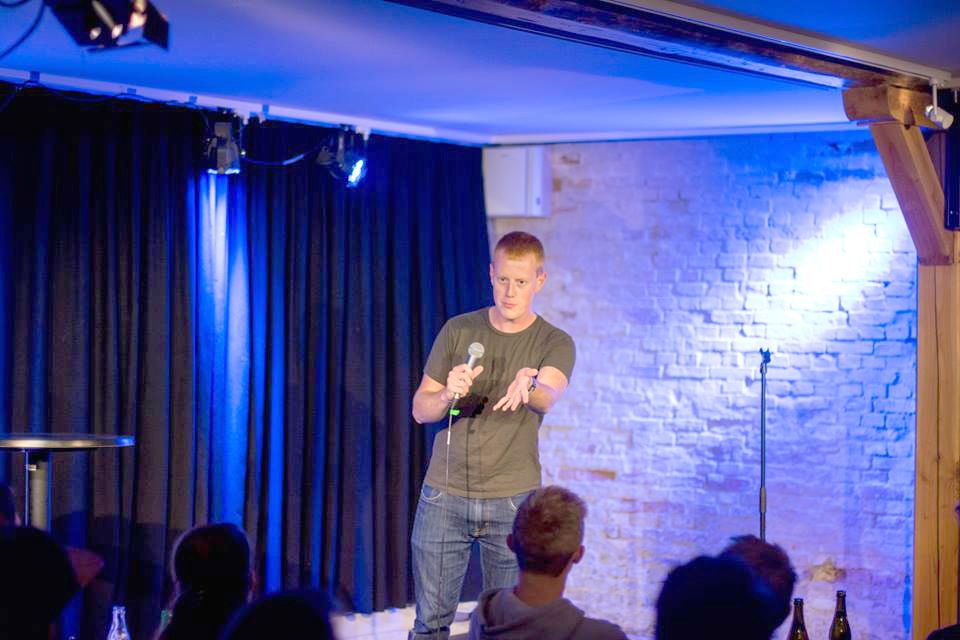
What is your comedy like?
I use a lot of Danglish, so I talk about the Danish language and mix it with English. I think that Danes really like that, because for example sometimes you go and do these shows in the middle of nowhere and everybody in the room is like 60-plus and they think: “Okay, this English guy is going to talk about stuff we don’t know in a language we don’t know.” But then I start talking about them and their language and they find it really funny.
How would you describe the Aarhus English-language comedy scene?
There isn’t much, but when I’ve performed I’ve found that people are sweeter and more relaxed compared to Copenhagen, where audiences tend to be a little more energetic – possibly due to more internationals present.
Could you tell us a sample joke?
I am speaking English, because Danish is really difficult. And I’m proud of my girlfriend for learning Danish, I think it’s really, really good. I tell her every day: “I am so proud of you for learning Danish.” And she says to me: “Conrad, I was born in Denmark!”
What did you study? Can you study comedy?
You can even study David Beckham. A degree in David Beckham. The most worthless degree ever. I studied war and terrorism. Really random. Later I came to Denmark and I studied anthropology.
But then I did stand-up for fun, started getting popular and people were like: “You know you can make money out of this.” That’s the weird thing with comedy: either you’re making nothing or you make thousands.
What’s your favourite joke about Denmark?
I have a joke where I say that the sky and depression have become friends. And in the morning when I open the curtains in my bedroom, it gets darker inside.
How are Danes as an audience?
Much more relaxed than British, but can be very shy. You can see them smiling, but they don’t want to laugh out loud.
How would you describe Danish comedy?
I think they have a very similar sense of humour to British. Kind of self-deprecating – they don’t take themselves too seriously. Also quite dark.
What is annoying about the comedy business?
People book you for jobs, but they don’t understand what comedy really is. I had to go to a place in south Zealand and it was just someone’s garden! I turned up: no microphone, no stage, no nothing, just a garden. And they were like: “Okay, you just do some comedy now.” I did have a good beginning, but then it went really badly. Like Hillary’s campaign.
What’s the worst reaction you’ve ever got?
I said that I went to church with my girlfriend and her family. The priest made us pray and told all of these things, and I thought: “This is so silly. God doesn’t speak Danish!” And this old woman stood up at the back and screamed: “Yes he does!” and walked out.
What do you think about Danes?
This Jante Law. They’re so humble. There are so many comedians that I am trying to get to do shows in English and they say: “Conrad, my English is not good enough, I could never do it.” and then I go back to England and I meet people whose first language is English and you can’t understand what they’re saying.
NEW IN TOWN
Name: Adrian Mackinder
Nationality: British
Age: 38
Type of comedian: stand-up/ improv, writer, actor
Years of experience: 10
Living in Denmark since: 2015
Next performance in CPH: Improv on Dec 4 & 10 at ICCT
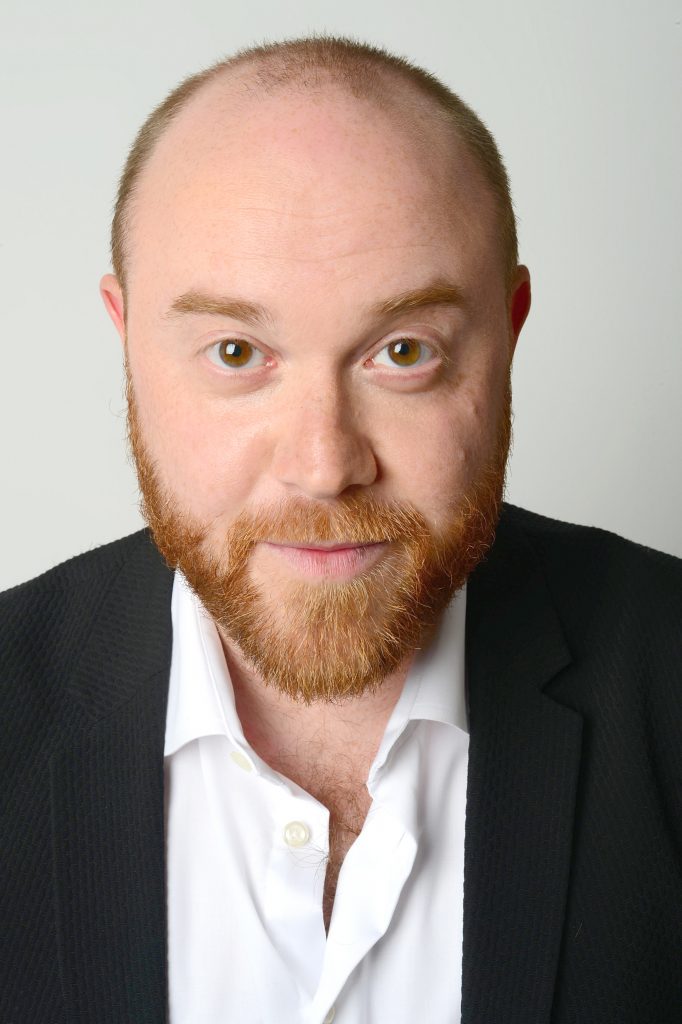
When did you start performing here?
This autumn. I have been doing improv in tandem with stand-up. Although I would like to do more stand-up.
How have you gone about seeking stand-up work in Denmark?
I searched on Google and Facebook, but with no luck. I then emailed the various contacts on the sites/pages that came up. I also spoke to a comic I met at the improv theatre. But there was surprisingly little.
Does it feel different in comparison to UK?
In UK they are very proud of their comedy heritage, so as a result it is very competitive. With the British audience there‘s kind of a heckler thing; they are like: “Go on, make me laugh.” And as soon as they‘re not laughing, they smell the blood in the room and go for you.
Here the audience is much more supportive. They’re on the side of the comedian before he’s said anything, which is a rare thing.
What should we google with your name to find comic gold?
The Plotters. A short film based on the Gunpowder Plot. I came up with the idea, co-wrote it, filmed it, and played in it. Basically the plot is that the Gunpowder Plot didn’t work, because everyone had the same name and looked alike. It’s true, they were all Robert or John with the same beard and hair.
It’s a short scene the night before. They suddenly realise that no-one knows who anyone is and what they’re supposed to be doing.
How would you describe your comedy style?
Frustrated-observational. You know I tend to look at the world and get very frustrated. It is usually stupidity – people’s stupidity. Currently I am also doing a lot about my experience of moving to Denmark. It’s discovering the cultural differences. For example, how Danish people just don’t flirt, whereas English people, we can’t help but flirt.
Could you tell us a sample joke?
My son is getting older and I will have to have ‘the talk’. It is going to be really awkward, because it is a difficult piece of information to process in a young boy. You are going to tell him that all the dinosaurs are dead. So where are they? They’re dead? How many? All of them? I don’t want the pressure of that.
What’s the funniest thing about Denmark?
The supermarkets are awful. Netto has this approach: “Yeah we got stuff, but you know, you are going to have to find it.” You walk in to buy some nappies, and they’re next to the bleach and sausages. It looks like they just got stuff into the building and left it there.
What is the attitude towards comedy in English in Denmark?
I think the Danes are fine with it. They’re open to it and even more than that: they’re crying out for it. And I think there is no reason why there can’t be a huge English-speaking comedy scene here. Wherever you‘re from, chances are you don’t speak Danish. That thousands who don’t have entertainment.
How PC is Denmark and how does that affect your material?
Not at all. Take feminism: English people are coming here and still feel a need to debate about it, while the Danes just shrug and are like: “Well of course women should have the same rights as men – why are we even talking about this?”
IN DANGLISH
Name: Valdemar Pustelnik
Age: 33
Nationality: Danish
Type of comedian: storyteller (stand-up, hosting, writing, acting)
Years of experience: 8
Living in Denmark since: he was in nappies
Next performance in CPH: some time in February
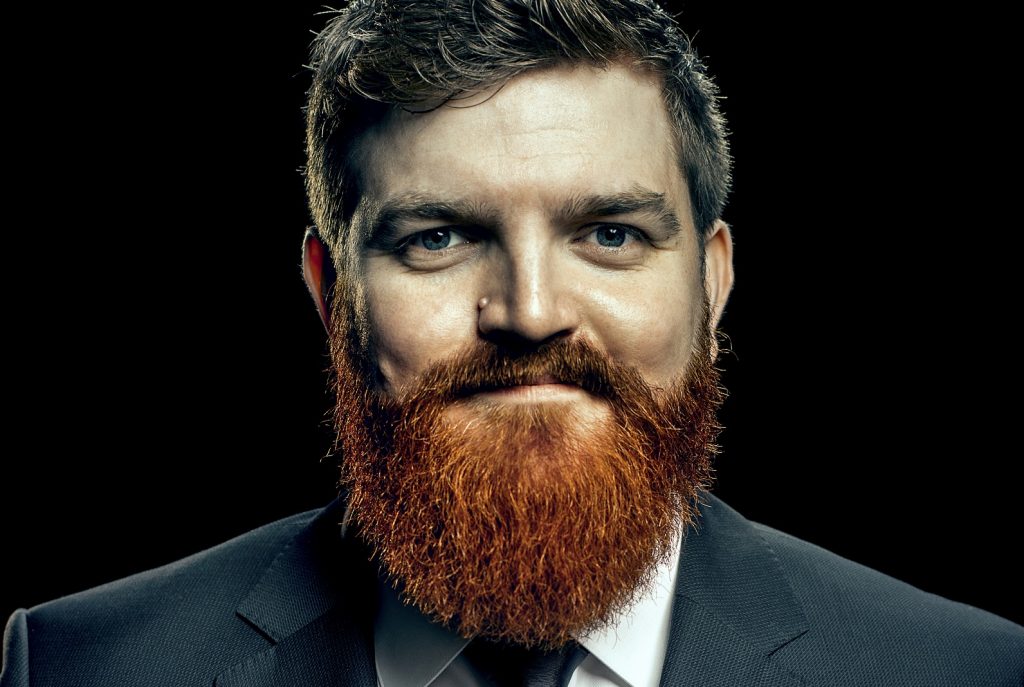
You perform both in Danish and English?
Over the last couple of years I have done it pretty much 50/50.
Which one do you prefer?
I prefer English, because it’s a better language for comedy. There’s more detail and you can play around a bit more.
How would you describe your comedy?
It’s very personal: stories about my life. It’s beginning to be more about politics, because it seems like the world is falling apart. I can’t see how it’s possible to not consider politics now. I can’t see how you can just watch the world burn.
Could you give us a sample of your comedy?
I do a lot about facts. Turns out that camels don’t have water in their humps, they have fat. And I think it’s such a shame that we live in a society in which they feel they have to lie about it.
Where do you think the comedy world is turning?
It’s moving towards a lot of competition, because today people can have every kind of entertainment simply on their phone or laptop. It is actually difficult to get hold of the international crowd, because it seems like internationals in Denmark are getting too much hygge.
When they first come here, they want to see things, they want to go out, but then they get infected with hygge. And you just have to shake people up and say: “No, no, no, you have to come out, you have to see this!”
What kind of qualities should a person have to be a successful comedian?
You have to be stubborn and practise for years. You have to accept the fact that you are going to fail. So it’s all about accepting that you are a big failure until you have done it enough.
You will have a show where everything is perfect and you think: “This is amazing! I am the best comedian in the world!” and then the next day you’ll have a gig somewhere and it will be horrible and you will think: “I want to go home and cry, and never do this again.”
What is the attitude towards you performing in English?
I think it’s only positive. If I am Danish and I’m performing in English, people think that it’s just an international outreach for me, forming an international audience.
How many Danes would there be in the audience during an international comedy night?
Maybe 75 percent internationals and 25 percent Danes.
Would your family watching make you uncomfortable?
I did a show a few years back where a final piece of the gig was that I wore a Viking’s helmet and I then took off my clothes. My parents came to see the show and my brother, his girlfriend and her parents, so everybody was there – a large part of my family.
I didn’t know that they were going to be there, but I saw them before the show and thought: Well, I decided to do this, so this is what I’m going to do. My mom is an old hippy, so she was very proud of me after the show. It was weird.
CRAZY SUCCESS
Name: Vivienne McKee
Nationality: British
Age: It’s rude to ask a lady!
Type of comedian: Stand-up, comic actress, writer
Years of experience: 40
Living in Denmark since: 1981
Next performance in CPH: Crazy Christmas Cabaret at Glassalen, Tivoli until Jan 12
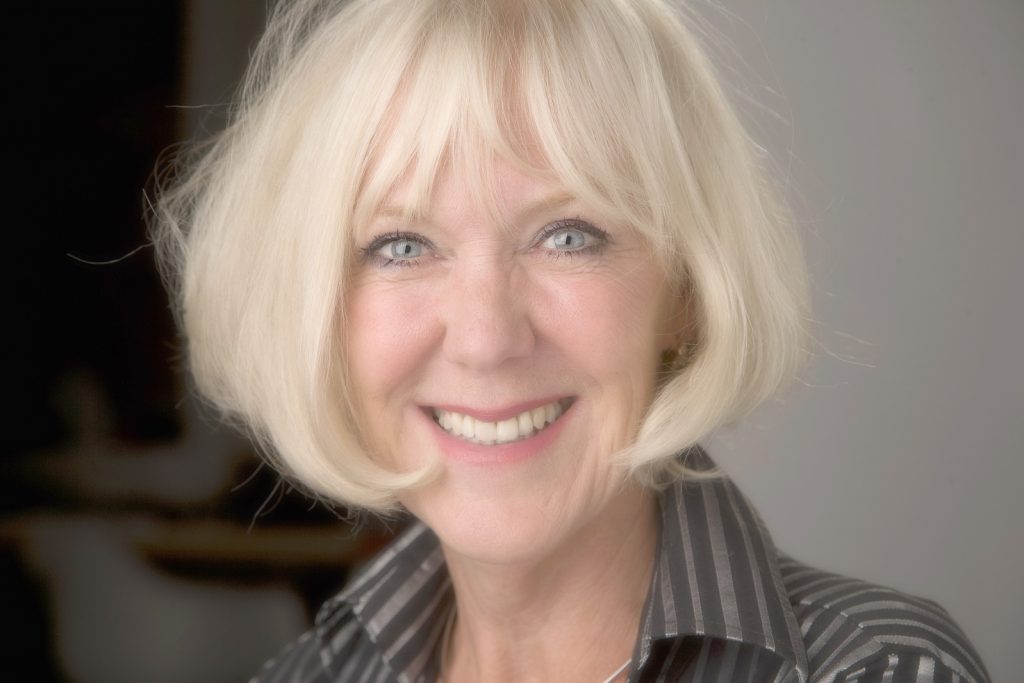
You’re this country’s most successful Anglophone comedian. What’s the secret of your success?
First of all, I have always enjoyed telling stories about things that happen to me in my daily life and making people laugh. I usually portray myself as the gullible, useless one in these stories: the ‘outsider’ who hasn’t quite grasped the situation properly. People love to laugh at other’s inadequacies and, as a foreigner in Denmark, the wife of a Dane, and a struggling professional woman in a man’s world, I have a wealth of material to offer.
Secondly, even though I have lived in Denmark for over 30 years I do not feel Danish, but neither do I feel British. I live in a ‘No Man’s Land’ between the countries and enjoy observing the disadvantages and the foibles of both nations. In addition, I travel a lot and constantly pick up information about other countries, which has proved useful to me when I entertain at international conferences and companies.
Thirdly, as I have lived in Denmark for many years I have collected a huge amount of material about the Danes and how they tick. Luckily for me, the Danes love to hear these comments and I feel free to come up with all kinds of observations about them – fun and often hard-hitting.
Was there a clear moment when you realised you were a success?
There was no clear moment. I learned by observing, writing notes and, most of all, doing. I trained as an actor so I have no problem performing in front of large audiences, and I have improved my comedy delivery enormously over the years. It’s easy to know when you’re not doing it right – nobody laughs!
What advice would you give to any Anglophone comedians newly arrived in Denmark?
My advice is that they spend time learning the Danish language and really getting to grips with Danish culture. It is not easy to take comedy from one country to another without doing a lot of homework. The Danes have their own sense of humour. They could never, for example, have created the Monty Python style of comedy. They laugh at it but their home-grown comedy is very different.
Do you detect a difference in the reception to your comedy delivered in Danish compared to English?
Those of us who speak a second or third language know that we change a little when we communicate in another language. Personally I prefer the ease of speaking English on stage because it makes improvisation and interaction with the audience quicker and wittier. Fortunately for me the Danes understand English incredibly well and usually ask me to perform in my mother tongue.
Which is the harder language to deliver comedy in? What challenges do you face.
Even when we speak Danish fluently, the pronunciation is unbelievably difficult for us foreigners to master. This can provoke laughter, but it is not always ideal for communicating subtle comic points!
WINGING IT
Name: Erika Balint
Nationality: Romanian
Age: 24
Type of comedian: improv
Years of experience: 1
Living in Denmark since: 2012
Next performance in CPH: Mon, Wed, Fri at ICCT

How would you describe improv? What does it mean to you personally?
It’s a type of theatre with no script, no predetermined characters, locations. Performers are always truthful and reacting as their gut tells them to. It pushes me to get out of all the boxes I put myself into. It’s expanding my limits, it’s letting me be whoever I want to be.
Do you see any difference between Danes and internationals watching your performance?
Internationals, especially students – they laugh a lot louder. Danes as an audience are very scared to express themselves. And you always know when there’s more Danes watching your performance, because it gets quiet. It is such a Danish thing, not being seen and heard. But I love it a lot, because I was like that most of my life. It’s also kind of mind-boggling how everything is funny in Denmark – how you can make fun of everything.
So you wouldn’t say that Denmark is PC?
Not at all. We try to be PC on stage, but we also try to make fun of it when it goes too far.
What does it take to be a good performer?
I think it’s very important to be a good listener, to be a good reader of the human experience and of the people around you. Because ultimately what your audience wants to say is: “Aha! That’s me, I’ve done that!” They will laugh if they recognise parts of themselves in what you tell them.
Since English is not your native language, is it difficult to perform?
I write in English, I think in English, but it’s not my native tongue and some words escape me sometimes. We had the grand opening show, and this British guy I was in a scene with kept saying: “Hamper”, “Let’s build hampers together!”, and I was like: “Yep, he has the secret recipe!” and I had no clue what a hamper was.
And then I found out it’s this basket – like a goodie or laundry basket. So it creates funny moments, just to have these little scenes of getting ‘lost in translation’.

